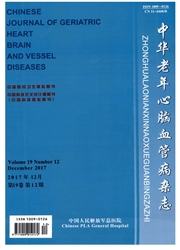

 中文摘要:
中文摘要:
目的评价常用超声指标、血清氨基末端脑钠素前体(NT-proBNP)及QRS波时限(QRSd)在预测心脏再同步化治疗(CRT)效果中的价值。方法选择因难治性心力衰竭行CRT治疗的患者80例,于术前及术后6个月行超声心动图检查,获取常规二维超声参数、同步性参数;于术前及术后7d完善血清NT-proBNP及心电图QRSd检测。以治疗后6个月左心室收缩末期容积较术前减小≥15%为治疗有效。结果术前同步化指数(Ts-12SD)对CRT疗效有预测价值(AUC=0.703,P=0.019;Ts-12SD≥34.6ms时敏感度及特异度分别为61.8%和70.6%),余同步性指标对CRT疗效无预测价值(P〉0.05)。术前NT-proBNP水平对CRT疗效亦有预测价值(AUC=0.75,P=0.005)。术前QRSd对CRT疗效无预测价值(P〉0.05)。结论常用超声心动图指标中,仅Ts-12SD能预测CRT疗效。术前NT-proBNP水平对CRT疗效有一定的预测价值,而术前QRSd不能预测CRT疗效。
 英文摘要:
英文摘要:
Objective To assess the value of echocardiographic parameters,N-terminal pro-brain natriuretic peptide(NT-proBNP),and the duration of QRS wave(QRSd)in predicting the response to cardiac resynchronization therapy(CRT).Methods Eighty patients accepted CRT because of refractory heart failure were enrolled.Echocardiography was performed to acquire two-dimensional echocardiography parameters and to evaluate inter-and intra-ventricular dyssynchrony before and after 6 months of CRT.The concentration of NT-proBNP was detected and QRSd was measured before and after 7 days of CRT implantation.At least 15% reduction in LVESV at the 6-month after CRT was defined as responders.Results The standard deviation of time to peak myocardial systolic velocity of all 12 LV segments(Ts-12SD)is relatively valuable in predicting CRT responders(AUC=0.703,P =0.019;Ts-12SD≥34.6 ms has the relatively high sensitivity of 61.8% and specificity of 70.6%),other synchrony parameters could not predict the response to CRT(NS).The level of NT-proBNP before CRT implantation could predict the response to CRT(AUC=0.75,P=0.005).The QRSd could not predict the response to CRT(NS).Conclusions Only Ts-12SD of echocardiographic parameters which were usually used could predict the response to CRT.The level of NT-proBNP before CRT implantation is valuable in predicting the response to CRT.The QRSd could not predict the response to CRT.
 同期刊论文项目
同期刊论文项目
 同项目期刊论文
同项目期刊论文
 Is Right Ventricular Outflow Pacing Superior To Right Ventricular Apex Pacing In Patients With Norma
Is Right Ventricular Outflow Pacing Superior To Right Ventricular Apex Pacing In Patients With Norma Is the optimal atrioventricular delay paced from right ventricular outflow tract different from righ
Is the optimal atrioventricular delay paced from right ventricular outflow tract different from righ 期刊信息
期刊信息
